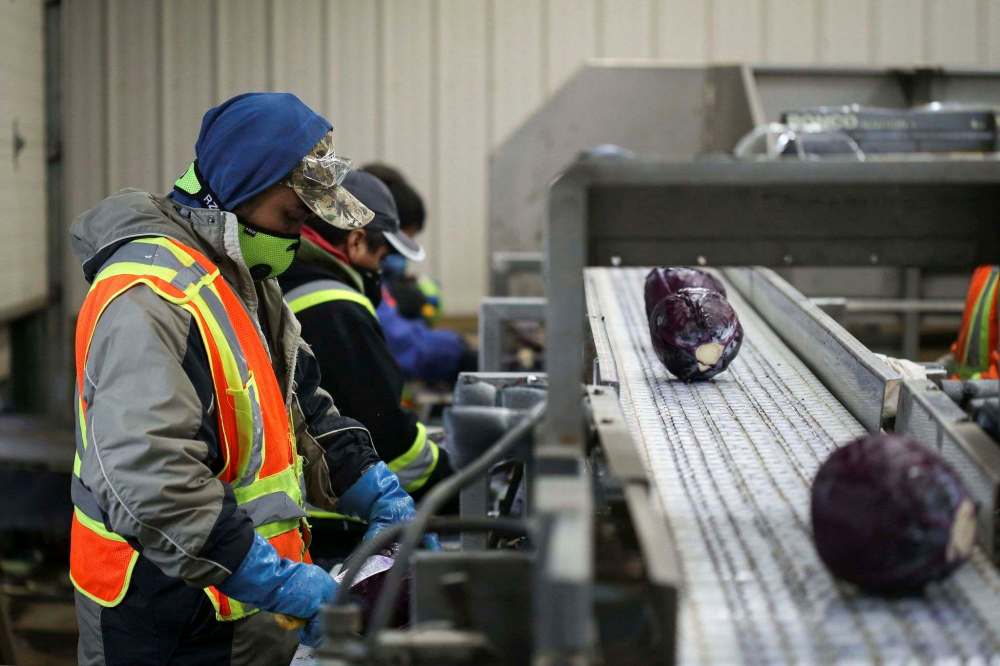New citizenship plan targets agricultural workers
Advertisement
Read this article for free:
or
Already have an account? Log in here »
To continue reading, please subscribe:
Monthly Digital Subscription
$0 for the first 4 weeks*
- Enjoy unlimited reading on winnipegfreepress.com
- Read the E-Edition, our digital replica newspaper
- Access News Break, our award-winning app
- Play interactive puzzles
*No charge for 4 weeks then price increases to the regular rate of $19.95 plus GST every four weeks. Offer available to new and qualified returning subscribers only. Cancel any time.
Monthly Digital Subscription
$4.99/week*
- Enjoy unlimited reading on winnipegfreepress.com
- Read the E-Edition, our digital replica newspaper
- Access News Break, our award-winning app
- Play interactive puzzles
*Billed as $19.95 plus GST every four weeks. Cancel any time.
To continue reading, please subscribe:
Add Free Press access to your Brandon Sun subscription for only an additional
$1 for the first 4 weeks*
*Your next subscription payment will increase by $1.00 and you will be charged $16.99 plus GST for four weeks. After four weeks, your payment will increase to $23.99 plus GST every four weeks.
Read unlimited articles for free today:
or
Already have an account? Log in here »
Hey there, time traveller!
This article was published 14/05/2020 (2060 days ago), so information in it may no longer be current.
OTTAWA — A long-awaited program to give temporary agricultural workers a path to citizenship will be launched today, but its tight criteria will exclude many of them, including those who work in Manitoba.
“Immigration criteria is set up for urban-centric occupations and not rural, farm and food occupations,” said Janet Krayden, a spokeswoman for Mushrooms Canada.
The federal Liberals announced the agri-food immigration pilot program last summer, but delayed its launch, set for March, due to COVID-19. It will offer permanent residency to non-seasonal, year-round agricultural workers in Canada who meet certain criteria.

Ottawa will grant permanent status to as many as 8,250 workers over three years. Just as many people can qualify as family members, for a total of 16,500.
But applicants have to pay for an assessment of their home country’s high school degree. They also must pay for a Canadian Language Benchmark-4 language test, a level that involves being able to read a recipe and give driving directions.
“The requirements are fairly high,” said Diwa Marcelino, an organizer with Migrante Manitoba.
Seasonal workers, who continue to spend summers in Canada before returning to their home countries, are ineligible for the pilot program.
Yet the Canadian Agricultural Human Resource Council praised the program, saying the sector has lobbied for years to keep workers with skills that agricultural companies need, but whom Ottawa doesn’t deem as specialized labour.
“This is what this new program is designed to address,” said council head Portia MacDonald-Dewhirst.
Her group found that in 2017, 1,100 unfilled Manitoba agriculture jobs cost the sector $367 million in lost sales. The council believes Manitoba is on track to fall short by 5,300 jobs at the end of this decade, as demand rises for grain, oilseeds, beef and pork.
MacDonald-Dewhirst said her industry has pushed hard to hire Canadians, but recruitment campaigns haven’t bridged the growing job gap that leads to unharvested food.
Now, COVID-19 travel restrictions make it harder to fly in foreign workers and safely house them, and the coronavirus is disrupting supply chains that import food.
“This is a great time to be doing this project,” MacDonald-Dewhirst said of the pilot. “These are people who are here on a temporary basis, and are looking to make Canada their home; they’re excited to do so.”
Marcelino fears the program will worsen the exploitation of foreign workers. His group has long advocated that agricultural workers are only safe when they have Canadian citizenship.
“There’s a huge power imbalance employers have over their employees, because their status is dependent on their employment,” he said.
Marcelino argued employers will use the pilot program as leverage to make sure workers don’t cause a fuss over labour conditions.
“You have this even bigger carrot on a stick that workers are vying for.”
Marcelino argued that’s especially dangerous during COVID-19, with migrant workers alleging that Alberta meat plants encouraged them to keep working even though they had symptoms, sparking some of the largest coronavirus outbreaks on the continent.
“It’s a disappointment, and I think that Canadians expect more from the government, to provide safe workplaces,” he said.
Still, Krayden said Mushrooms Canada knows about hundreds who plan to apply.
She hopes Ottawa will temporarily loosen the requirement to have foreign high school diplomas assessed, as COVID-19 has shut down firms that offer that service.
“They’ve got the skills and experience needed on our farms, and we need them for our food security today,” she said.
“They want to stay here, and Canada should let them.”
dylan.robertson@freepress.mb.ca


